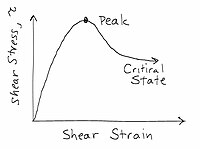
Photo from wikipedia
Abstract It is well known that the deformation and stress-resistant characteristics of fine-grained soils, especially soft clays, are significantly influenced by the soil softness. It is therefore very important to… Click to show full abstract
Abstract It is well known that the deformation and stress-resistant characteristics of fine-grained soils, especially soft clays, are significantly influenced by the soil softness. It is therefore very important to employ a model which can accurately simulate the effects of this phenomenon. A constitutive model must be able to create a balance among stress paths, the number of parameters, the process of parameter determination, and finally, the simplicity of the computational calculations. The current study investigates the performance of a two-yield surface (cone and cap yield surface) model for soft soils. The efficiency of the cap yield surface has been studied as well. The model has been calibrated by employing the data derived from previous researches for Bangkok clay. The incorporated data have been obtained from the results of CD triaxial, CU triaxial, and oedometer tests. The proposed method for the model calibration can accurately predict the triaxial test results and oedometer test stress path simultaneously. This method for predicting the soil behavior is based on the main soil characteristics taken from common soil mechanics tests. It can be widely employed for engineering practices, especially when complicated soil behavior is encountered.
Journal Title: Soils and Foundations
Year Published: 2019
Link to full text (if available)
Share on Social Media: Sign Up to like & get
recommendations!